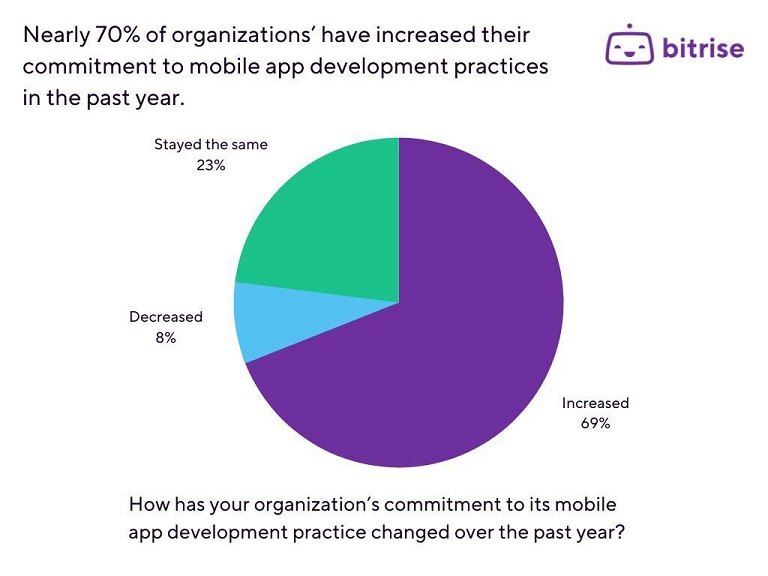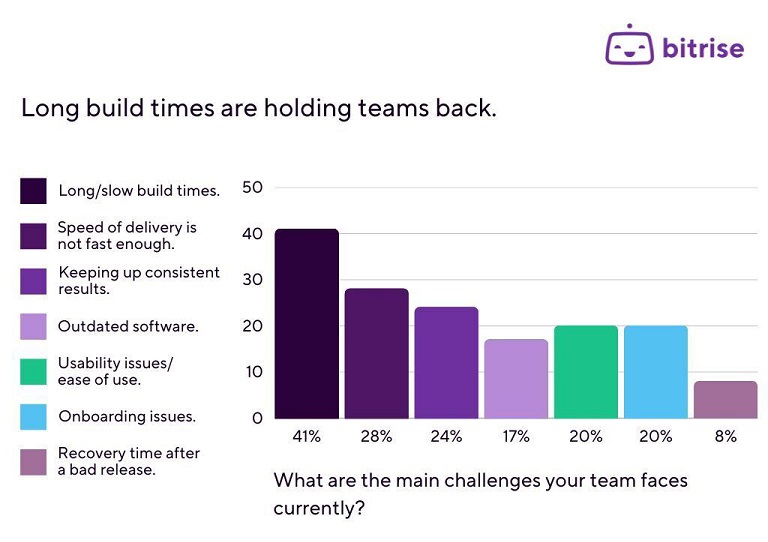Backslash Security(link is external) announced significant adoption of the Backslash App Graph, the industry’s first dynamic digital twin for application code.
When mobile apps first entered the market some 15 years ago, companies' biggest challenge was how quickly they could redirect any level of DevOps resources to mobile app development in order to keep up with the quickly rising demand.
And it worked, for a while. From a high-level perspective, mobile app development requires many similar tools and skills as that of traditional software development — developers, programming languages, testing, deployment, automated workflows — that got companies through mobile's early years.
In many cases, it wasn't until developers were tasked with significantly scaling mobile app development, and delivering new features and app versions on a weekly basis, that they realized a new challenge: Their mobile initiatives have outgrown these generic app development conditions.
More than 1,300 mobile practitioners shared a look inside their organizations' mobile strategies and revealed that just 8% of their companies have a dedicated team for mobile app development.
While this may seem contradictory to companies' mobile ambitions, most developers will agree that pushing for an entire set of tools, resources, skills and talent dedicated to mobile alone is almost unheard of in the DevOps industry.
As more teams start noticing the growing pains of trying to make traditional DevOps practices work in mobile-first environments, here are three reasons why this will soon have to change.
1. Mobile Teams Have Been Borrowing From Traditional DevOps
In their first several years, demand for mobile apps grew faster than the DevOps industry's ability to create new tools and resources for developing mobile apps.
As a result, developers had no choice but to make do with what they already had—or could borrow—from traditional DevOps practices, including development platforms, processes, and even talent.
But with some companies' entire business models now based on mobile alone (think: Uber, Waze, Venmo), it only makes sense that investments in mobile app development processes should follow—and they're starting to. In the Mobile DevOps Summit survey, nearly 70% of mobile practitioners said that their organizations' commitment to mobile app development practices have increased over the past year.

These continued investments in Mobile DevOps processes will ultimately be what sets companies apart from those who are still dependent on traditional DevOps in terms of getting their apps to market faster, releasing new features more frequently, and achieving higher visibility in app marketplaces.
2. The Mobile Environment Presents Challenges That Traditional DevOps Practices Never Touch
One of the strongest cases mobile developers can make when campaigning for their own platform-specific tools is illustrating the many nuances of mobile app development compared to other types of software.
At the top of this list are the two main mobile operating systems, Apple and Google, and their evolving sets of rules and guidelines for distributing apps within their ecosystems.
Not only do these companies dictate the specific app architecture and features that must be incorporated into mobile app development in order for them to appear in their marketplaces, but they have additional requirements around how frequently companies must update their apps in order to rank highly enough in these marketplaces to capture consumer interest.
Mobile developers additionally have to keep up with—and consistently update — hundreds more versions of their mobile apps than they do for web or other software apps, considering the sheer amount of mobile devices available. This doesn't just include Apple and Android, but other systems, as well as every older version of their individual devices that could still be in users' hands.
All of this requires a much greater need for speed of mobile app building, testing and releasing than is needed on other channels. But achieving this level of speed remains one of developers' biggest challenges: Mobile practitioners say that long and slow build times (41%), as well as speed of delivery (28%), are two of their biggest challenges in mobile app development.

By using tools that were created with these mobile-specific nuances in mind, developers will be in a better position to mitigate these challenges.
3. Developers' Success Will Stall without New Investments in Mobile-Specific Expertise, Tools and Resources
.
Without new resources to drive their organizations' mobile efforts forward, developers agree that their mobile operations will reach an impasse. Nearly half (46%) of mobile practitioners say that the biggest Mobile DevOps challenge their organizations face is a lack of mobile-specific expertise, tools, and resources.

Rather than having developers split their attention between mobile app development and other DevOps workstreams, for example, mobile teams should be constructed entirely of individuals that are intimately familiar with the uniquities of other mobile-specific technologies.
Understanding the differences between mobile and other types of app development, and then recognizing where there are gaps in their current processes keeping developers from addressing these differences, is a good place to start.
Industry News
SmartBear launched API Hub for Test, a new capability within the company’s API Hub, powered by Swagger.
Akamai Technologies introduced App & API Protector Hybrid.
Veracode has been granted a United States patent for its generative artificial intelligence security tool, Veracode Fix.
Zesty announced that its automated Kubernetes optimization platform, Kompass, now includes full pod scaling capabilities, with the addition of Vertical Pod Autoscaler (VPA) alongside the existing Horizontal Pod Autoscaler (HPA).
Check Point® Software Technologies Ltd.(link is external) has emerged as a leading player in Attack Surface Management (ASM) with its acquisition of Cyberint, as highlighted in the recent GigaOm Radar report.
GitHub announced the general availability of security campaigns with Copilot Autofix to help security and developer teams rapidly reduce security debt across their entire codebase.
DX and Spotify announced a partnership to help engineering organizations achieve higher returns on investment and business impact from their Spotify Portal for Backstage implementation.
Appfire announced its launch of the Appfire Cloud Advantage Alliance.
Salt Security announced API integrations with the CrowdStrike Falcon® platform to enhance and accelerate API discovery, posture governance and threat protection.
Lucid Software has acquired airfocus, an AI-powered product management and roadmapping platform designed to help teams prioritize and build the right products faster.
StackGen has partnered with Google Cloud Platform (GCP) to bring its platform to the Google Cloud Marketplace.
Tricentis announced its spring release of new cloud capabilities for the company’s AI-powered, model-based test automation solution, Tricentis Tosca.
Lucid Software has acquired airfocus, an AI-powered product management and roadmapping platform designed to help teams prioritize and build the right products faster.
AutonomyAI announced its launch from stealth with $4 million in pre-seed funding.













